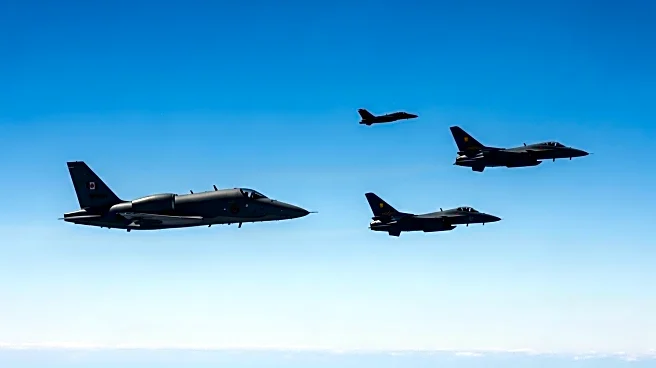What's Happening?
A Canadian military aircraft, part of Operation NEON, was intercepted by Chinese jets while monitoring North Korean vessels in the East China Sea. The mission, involving a CP-140 Aurora aircraft, aims to enforce U.N. sanctions against North Korea by gathering intelligence on illicit trade. The Canadian plane, operating in international airspace, was approached by Chinese fighter jets, which shadowed it closely. Operation NEON is a multinational effort to pressure North Korea to abandon its weapons of mass destruction programs, with Canada contributing to intelligence gathering and sharing data with the U.N.
Why It's Important?
The interception of the Canadian aircraft by Chinese jets highlights the geopolitical tensions in the Asia-Pacific region, particularly concerning North Korea's nuclear ambitions. China's actions underscore its strategic interests and its role as an economic lifeline for North Korea. The mission's risks are heightened by the proximity of Chinese military responses, which could escalate into broader diplomatic or military confrontations. The situation reflects the complex dynamics of enforcing international sanctions and the challenges of maintaining regional stability.
What's Next?
The continuation of Operation NEON will likely involve further interactions with Chinese military forces, necessitating careful navigation of international airspace laws and diplomatic protocols. The international community, particularly U.N. member states, will need to assess the effectiveness of sanctions and consider additional measures to address North Korea's nuclear threat. The evolving situation may prompt discussions on enhancing multinational cooperation and strategies to mitigate risks associated with such enforcement missions.
Beyond the Headlines
The incident raises questions about the effectiveness of current sanctions on North Korea and the role of major powers like China and Russia in supporting Pyongyang. The geopolitical landscape is further complicated by the potential for renewed dialogue between North Korea and the U.S., as indicated by past meetings between President Trump and Kim Jong Un. The broader implications for regional security and international relations will depend on the responses of key stakeholders and the strategic decisions made by involved nations.










